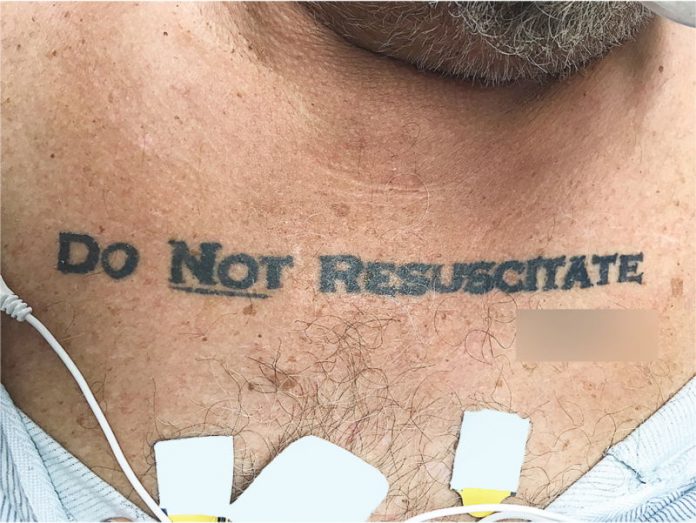An unconscious patient caused a panic when doctors discovered he had the words ‘Do Not Resuscitate’ tattooed across his chest.
The 70-year-old man, who was diabetic, left medics with an ethical dilemma when he was admitted to hospital with a high blood-alcohol level.
In a case report published Thursday in the New England Journal of Medicine, the doctors recounted:
This patient’s tattooed DNR request produced more confusion than clarity, given concerns about its legality and likely unfounded beliefs that tattoos might represent permanent reminders of regretted decisions made while the person was intoxicated.
The unresponsive patient was brought to the emergency department by paramedics. He had high blood-alcohol levels and no identification or family with him. After a few hours, hospital staff saw his condition slipping. His blood pressure dropped and acids were building up in his blood.
Despite the prominent tattoo, the doctors didn’t know if they should trust it. They contacted social workers to try to find his next of kin and made several attempts to revive him enough to get him to confirm his wishes. But the revival attempts failed.
“We initially decided not to honor the tattoo, invoking the principle of not choosing an irreversible path when faced with uncertainty,” the doctors reported. But the effort with which the patient seemed to take to have the message inked onto his body nagged at them. After stabilizing him, they called for an ethics consultation.
The ethics consultants sided with honoring the tattoo. “They suggested that it was most reasonable to infer that the tattoo expressed an authentic preference, that what might be seen as caution could also be seen as standing on ceremony, and that the law is sometimes not nimble enough to support patient-centered care and respect for patients’ best interests,” the doctors recalled.
Luckily, at the same time, social workers located his patient information, including a copy of his Florida Department of Health “out-of-hospital” DNR order, which matched the wishes of his tattoo. “We were relieved to find his written DNR request, especially because a review of the literature identified a case report of a person whose DNR tattoo did not reflect his current wishes,” the authors note.
The patient, who had a history of chronic obstructive pulmonary disease, diabetes mellitus, and atrial fibrillation, continued to decline in health throughout the night. He died without further efforts of resuscitation, as requested.















